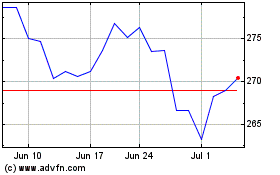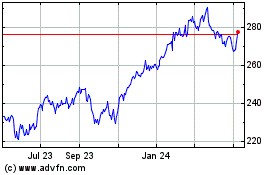By Peter Rudegeair and AnnaMaria Andriotis
This article is being republished as part of our daily
reproduction of WSJ.com articles that also appeared in the U.S.
print edition of The Wall Street Journal (July 23, 2020).
One website advertised dog products. Another advertised flowers;
another, home decorations. All of them were really fronts to
process payments for marijuana or designer drugs, prosecutors
said.
The Justice Department and the Federal Trade Commission have
recently brought a string of criminal and civil cases accusing
individuals and companies of using legitimate-looking websites to
deceive financial firms into processing unsavory purchases. Such
schemes are often called credit-card laundering or transaction
laundering.
Illegal purchases, including drugs, are being processed
unwittingly by banks and payments networks including Visa Inc.,
Mastercard Inc. and American Express Co., according to court
documents and people familiar with the matter. The yearslong boom
in e-commerce, even before it got an extra boost during the
coronavirus pandemic, has attracted entities looking to use its
infrastructure in unintended ways.
Financial cops are zeroing in on a weak link in the
online-payments system: middlemen that connect merchants to the
banks that help approve and settle transactions. From low-tech
independent sales organizations to Silicon Valley players like
PayPal Holdings Inc., Square Inc. and Stripe Inc., an array of
companies have sprouted up to help internet businesses take
payments.
The companies say they're committed to fighting misconduct.
Jodie Kelley, chief executive at the Electronic Transactions
Association, which represents payment processors, said her members
regularly terminate fraudulent merchants, including more than
10,000 merchants that were cut off in 2017 because of fraud. Ms.
Kelley said her members alert authorities about "bad actors,"
citing members who reported merchants for price gouging on face
masks and other goods when the coronavirus pandemic hit.
But the amount of due diligence each performs on merchants
varies. Some try to detect any fraud on their platform, and major
networks will often provide information to law enforcement to help
them catch culprits. Others turn a blind eye or willingly enable
it, authorities say.
"No processor, even if it spent a fortune, is going to perfectly
shield itself from fraudulent merchants," said Lois Greisman,
associate director of the FTC's Division of Marketing Practices.
The FTC, she said, "is seeking to root out processors that are
knowingly facilitating fraud."
In one recent high-profile case, the Manhattan U.S. attorney's
office accused two businessmen, Ruben Weigand and Hamid "Ray"
Akhavan, of tricking banks into processing more than $100 million
in transactions made through Eaze Technologies Inc., an online
marijuana marketplace.
Major card networks don't allow card purchases of products or
services that are deemed illegal, and marijuana is illegal under
federal law.
Prosecutors said in court filings that the two men set up online
retailers advertising dog products, diving gear and soda and
conspired to deceive banks to accept payments for marijuana sales.
The Federal Bureau of Investigation is also investigating whether
scandal-plagued German payments company Wirecard AG worked with Mr.
Weigand and Mr. Akhavan, The Wall Street Journal previously
reported.
Ira Rothken, a lawyer for Mr. Akhavan, said that the indictment
"essentially admits there was no 'transaction laundering' " because
major payment networks don't have merchant category codes for
cannabis transactions.
Both men have pleaded not guilty and asked a judge to dismiss
the indictment. Eaze, which wasn't charged, said it is cooperating
with authorities. Wirecard didn't respond; it has previously
declined to comment.
The volume of transaction laundering is hard to estimate. Often
networks such as Visa and Mastercard aren't aware of a problem with
a merchant until, for example, a large number of people dispute
transactions with that merchant. By then, much of the money has
already moved.
Roughly $500 billion of money laundering with credit, debit,
prepaid and other cards occurs online each year world-wide,
according to EverCompliant, which sells anti-money-laundering tools
and software. Typically, the merchants or card issuers take the
loss when cards are used fraudulently.
First Data Corp., one of the largest U.S. payment processors,
agreed in May to pay $40.2 million to settle FTC charges that for
years it ignored red flags when it processed consumer payments for
deceptive get-rich-quick schemes and debt-relief scams. First Data,
now owned by Fiserv Inc., said in a statement that it remains
committed to ensuring its business partners and merchants operate
with integrity. The company didn't admit or deny wrongdoing.
In 2018, the Justice Department accused the CEO of Backpage.com,
a classified-ads website known for its numerous sex-related
postings, of facilitating prostitution. Then-CEO Carl Ferrer
pleaded guilty and admitted to working "to find ways to fool
credit-card companies into believing that Backpage-associated
charges were being incurred on different websites." Mr. Ferrer is
awaiting sentencing.
There is an inherent tension around rooting out such problems.
Revenue for payments networks, processors and credit-card issuers
rises when transaction volumes rise. Payment processors and card
issuers often earn higher fees for transactions that look riskier.
For example, merchants can pay higher payment-processing fees for
online orders versus goods that are bought in person.
Payments companies can be less inclined to turn off a suspicious
company if it is generating lots of transactions, said Adam Wandt,
a researcher for the Center for Cybercrime Studies at the John Jay
College of Criminal Justice.
Card issuers, processors and networks collected $86.2 billion in
fees associated with Visa, Mastercard and AmEx credit-card
transactions made in the U.S. in 2019, according to the Nilson
Report, an industry publication. That was up from $46.9 billion in
2012.
Fighting credit-card laundering is a challenge. Visa and
Mastercard track the level of disputed transactions merchants
receive and can fine processors or make them terminate accounts
where disputes are too numerous. But both networks have found
situations where the merchants resurfaced under different names,
according to people familiar with the matter.
Also, Visa and Mastercard generally require businesses with
annual card sales of about $1 million or more to submit additional
paperwork to verify their businesses. But merchants can sign up
with multiple processors to bring their annual volume below the $1
million threshold.
In March 2019, the Pittsburgh U.S. attorney's office charged
several people in a criminal conspiracy to sell illegal sedatives
and other drugs over the internet. The people were accused of
starting shell companies, opening payment-processing accounts on
their behalf with PayPal, Square and Stripe, and using those
accounts to accept credit cards for drugs sold on other
websites.
In one instance, an investigator made an undercover purchase of
etizolam, a sedative that can't be prescribed or sold in the U.S.,
on an online marketplace called Domestic RCS in October 2017,
according to an affidavit submitted by the prosecution. At
checkout, the investigator was shown a message that the transaction
would show up on a credit-card bill under the name of a
courier-delivery service, the affidavit said.
In April 2018, Stripe deactivated the accounts of businesses
tied to the alleged scheme after Visa identified them as selling
controlled substances, according to the affidavit. Archived
versions of their websites showed that they advertised beauty
products, home decorations and flowers, respectively.
Three men pleaded guilty to different roles in the scheme.
Stripe and Square declined to comment. PayPal said it is committed
to combating "the illicit use of our services."
Write to Peter Rudegeair at Peter.Rudegeair@wsj.com and
AnnaMaria Andriotis at annamaria.andriotis@wsj.com
(END) Dow Jones Newswires
July 23, 2020 02:47 ET (06:47 GMT)
Copyright (c) 2020 Dow Jones & Company, Inc.
Visa (NYSE:V)
Historical Stock Chart
From Mar 2024 to Apr 2024

Visa (NYSE:V)
Historical Stock Chart
From Apr 2023 to Apr 2024
